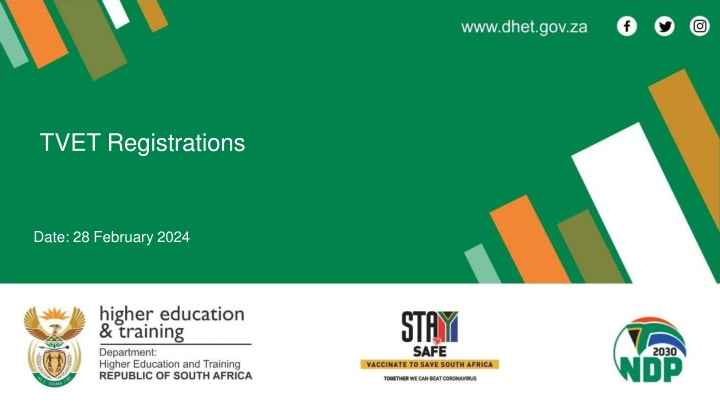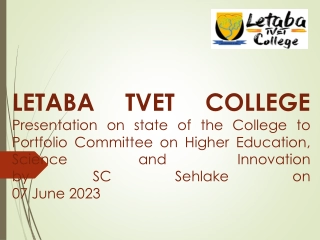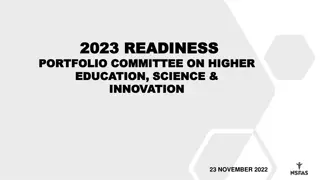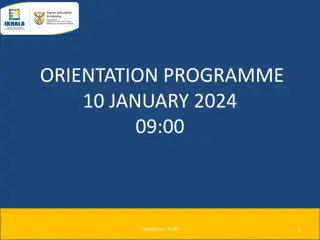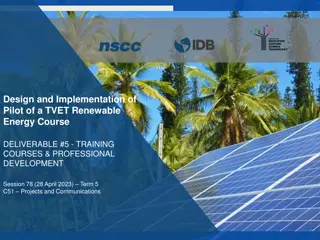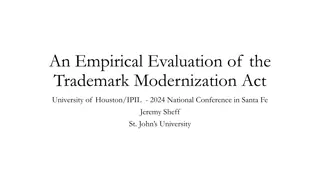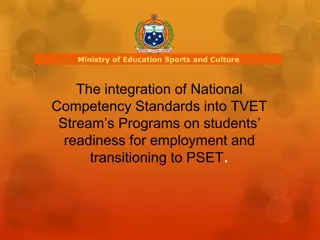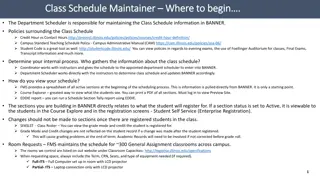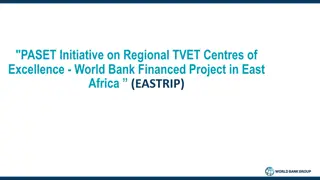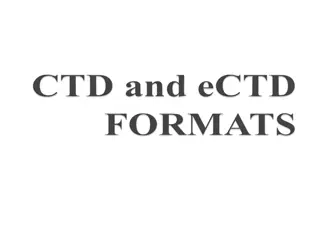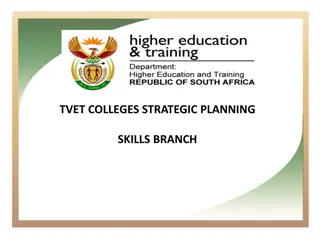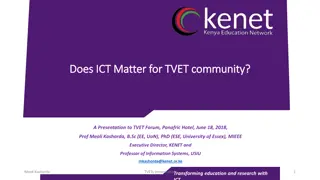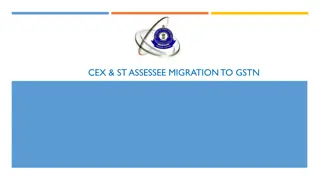TVET Registrations
The report discusses the TVET Branch's institutional monitoring of student enrollment, implementation of the SOP on enrollment, and applications and admissions of new students for the 2024 intake. It also addresses the certification backlog issues faced by TVET and CET colleges, highlighting the efforts to reduce and eliminate the backlog through a Certification Task Team. The report aims to provide progress updates to the Minister of Higher Education and relevant committees.
Download Presentation

Please find below an Image/Link to download the presentation.
The content on the website is provided AS IS for your information and personal use only. It may not be sold, licensed, or shared on other websites without obtaining consent from the author.If you encounter any issues during the download, it is possible that the publisher has removed the file from their server.
You are allowed to download the files provided on this website for personal or commercial use, subject to the condition that they are used lawfully. All files are the property of their respective owners.
The content on the website is provided AS IS for your information and personal use only. It may not be sold, licensed, or shared on other websites without obtaining consent from the author.
E N D
Presentation Transcript
TVET Registrations Date: 28 February 2024
Institutional Monitoring of Student Enrolment Over the last three years the TVET Branch has undertaken monitoring of the enrolment process, in all 50 colleges, at selected campuses, involving middle and senior managers at head office as well as regional offices. Oversight focuses on the readiness for the implementation of the SOP on enrolment and general readiness for the 2024 academic year. Oversight is aligned to the MATURITY MODEL that evaluates colleges against criteria to determine their functionality and efficiency. Implementation of the SOP on enrolment aims to standardise the enrolment practices and procedures across 50 colleges and campuses. It further aims to improve the quality of services provided to students during enrolment. Colleges are required to incrementally move towards an online applications and registration processes. However, it is accepted that the manual process is still in place for walk-ins , given that many students face challenges with doing online applications, especially in remote locations. The state of readiness of colleges to start classes at the beginning of the year is also evaluated against the tool.
SOP on Enrolment The SOP has 6 sub-processes i.e. 1. Enquiries management and advocacy/ marketing 2. Provision of career advisory services and placement testing 3. Applications 4. Selection and admission in the previous academic year (provisional) of new and returning students 5. Registration and confirmation thereof 6. Enrolment management and reporting. In this process the readiness for the academic year is assessed.
Applications and admissions of NEW students for the 2024 enrolment intake The total complete applications by NEW students received for the 2024 enrolment intake was 2 498 078. Received an increased bulk of its applications in January 2024 (827 535 complete applications). Number of new students admitted in 2023 for the 2024 academic year was 55 019. If the bulk of the applications are processed and new students admitted, the pressure on the beginning of the academic year is reduced, and results in efficient and effective management of the enrolment plan and registration processes. This reflective of Maturity Level 2 of the Maturity Model.
The certification backlog INTRODUCTION The certification backlog refers to candidate records that have met all certification requirements however a certificate has not been issued more than 90 working days after release of results. The Department of Higher Education and Training has been plagued by the TVET and CET Colleges certificates backlog dating back to 1992. A Certification Task Team (CTT) comprising of DHET, Umalusi and SITA representatives has been established to work on the certification backlog reduction and elimination. PURPOSE The purpose of this report is to provide the Minister of Higher Education, Science and Innovation and the Portfolio Committee on Higher Education and Training and Science and Technology (PCHEST) with progress made by the Chief Directorate: National Examinations and Assessment (CD: NEA), State Information Technology Agency (SITA) and the Council for Quality Assurance in General and Further Education and Training (Umalusi). The report will further highlight intervention strategies that are in place to reduce the backlog of certificates.
OVERVIEW OF CERTIFICATION BACKLOG EFFECTS The certification backlog in the main, was largely created by the outdated examination Information Technology (IT) system which cannot adequately condone and reconcile candidates achievement records across different examinations when students meet qualification requirements over multiple examination cycles.
Cont...OVERVIEW OF CERTIFICATION BACKLOG EFFECTS Below is a summary of the four qualifications (i.e. GETC: ABET Level 4, NATED (Business and Engineering Studies N1 - N6) and NC (V) Level 2 - 4. The NC (V) certification backlog has been further broken down into the two taxonomies (i.e. NC (V) first issue and NC (V) full certificates. Diff from Outstanding % Reduction 18-Feb- 03 Jan % Qualification Previous from based on 20 2023 Reduction Report baseline the baseline GETC:ABET 65 890 - 100.00% - - 100,00% L4 Business 29 473 - 100.00% - - 100,00% Studies Engineering 21 638 4 100.00% - - 100.00% Studies NC(V) First 410 - 100.00% - - 100,00% Issues NC(V) Full 7 866 - 100.00% - - 100,00% Certificates Total 125 277 4 100.00% - - 100.00%
Cont...OVERVIEW OF CERTIFICATION BACKLOG EFFECTS The first-issue certificates are conceptualised as certificates whereby a candidate has met part or full qualification certification requirements in one examination cycle including subject statements. Whereas, the full certificates are whereby a candidate has met all qualification certification requirements (passed all the required seven (7) subjects) over multiple examination cycles. The above infographic presents the number of certificates backlog per time interval and qualifications. The above infographic also shows statistical progress made on the certification backlog for all four qualifications for the period 18 February to 03 January 2023. The graph indication that two programmes have achieved 100.00% reduction of outstanding certificates from the initial records reported on the 18 February 2020: GETC: ABET L4 (100.00%), NATED Business Studies (100.00%). NATED Engineering Studies (100.00%). NC (V) First Issues (100.00%) NC (V) Full Certificates (100.00%)
Cont...OVERVIEW OF CERTIFICATION BACKLOG EFFECTS 1. GETC: ABET Level 4 As at 03 January 2023, the outstanding certification backlog has been reduced to a 100.00% from (65 890 records) reported on the 18 February 2020 whereas any records generated during the period where added to the list and the two percentage reporting, this indicates that there is no more any backlog for GETC: ABET Level 4 5.2.Business Studies As at 03 January 2023, the outstanding certification backlog has been reduced to a 100.00% from (29 473 records) reported on the 18 February 2020, this indicates that there is no more any backlog for NATED Business Studies. 5.3. Engineering Studies As at 03 January 2023, 4 records for Engineering Studies N1 to N6 examinations between the periods November 1992 to August 2019 remained outstanding. This figure represents a decrease of 21 628 which translates to 100% from the figure of 21 628 reported on 18 February 2020.
Cont...OVERVIEW OF CERTIFICATION BACKLOG EFFECTS 55.4. NC (V) First Issue As at 03 January 2023, the outstanding certification backlog has been reduced to a 100.00% from (410 records) reported on the 18 February 2020, this indicates that there is no more any backlog for NC (V) First Issues. 5.5. NC (V) Full Certificate As at 03 January 2023, the outstanding certification backlog has been reduced to a 100.00% from (7 866 records) reported on the 18 February 2020, this indicates that there is no more any backlog for NC (V) Full Certificate.
OVERALL PROGRESS ON GETC: ABET LEVEL 4, NC (V) AND NATED CERTIFICATION The following progress was made during the 18 February 2020 to 03 January 2023 reporting period: The Department, SITA and Umalusi have processed 125 277 from 125 277 records which translates to 100.00% from the period 18 February 2020 to 03 January 2023. There are no outstanding records as of baseline, therefore no records could be processed since 03 January 2023, by both DHET and Umalusi are shared with the SITA team on a bi-weekly basis for enhancement of the IT system and further processing. A list of the errors is shared between all role-players for direct intervention; these records will be processed and ultimately be cleared
Process Streamlining The e-query system is a 24-hour electronic service that is aimed at assisting all parties in the certification value chain to track queries relating to outstanding examination results and issuing of certificates and diplomas. Furthermore, it seeks to open a direct, interactive engagement between DHET and colleges as well as strengthening communication between college management and candidates. The e-Query system was being used by candidates more extensively during the Covid-19 nationwide lock down. The DHET examinations monitors promotes the use during monitoring of examinations. The PCHEST and Umalusi are also requested to assist with advocacy for more candidates to use the system. Working on the model to track and attend to all outstanding certificates on a bi-weekly basis as part of the certification task team activity with a view of replicating the same to every TVET College. CONCLUSION The Department and the other critical stakeholders line Umalusi and SITA has registered significant strides in reducing the certification backlog/historical records despite the challenge posed by the examination IT system batch certification functionality inconsistency that forces the team to continue processing some documents manually and updating the system afterwards.
Challenges and Mitigations NSFAS and financial challenges Because of outstanding debt and NSFAS payments not made, or applications not concluded, there were challenges such as financial constraints/ outstanding debt that hinder registration of returning students. Other In some instances, textbooks were not procured, which colleges were instructed to attend to urgently. Sporadic strike action occurred mainly because of NSFAS matters. In the main this is related to the pilot project on student accommodation implemented by NSFAS. The Department is actively engaged with NSFAS on this matter.
Challenges and Mitigations Re-admission of returning students This sub-process has not been implemented and opens the door to queues and pressure during the start of the academic year. Some of the reasons cited is the outstanding debt of these students. Special payment arrangements are required. Whilst every effort is made to mitigate the long queues the reality is that students in TVET colleges come from difficult socio-economic conditions. In essence, despite the queues, the college is able to work directly with students to assist them to continue with their studies, wherever possible Technical challenges in business system modules to digitalise and/ or automate application and registration processes. Mitigation: Engagement sector-wide and with the system service providers.
PORTFOLIO COMMITTEE Community Colleges: 2024 Registration, Enrolments & Commencement of 2024 Academic Year 28 February 2024 Thembisa Futshane 16
APPLICATIONS AND REGISTRATION Community Colleges opened on 18 January 2024 for both inland and coastal colleges. Monitoring and support of colleges state of readiness commenced at the beginning of the 2024 academic year and will continue until the end of March 2024. To date there is stability in the sector, in relation to applications, registrations and commencement of the 2024 classes. The current student enrolment data system works retrospectively. Colleges completed the 2022 capturing of student enrolments and will start capturing the 2023 enrolments. However, manual collation of the 2024 student enrolments will be completed by the end of March 2024.
STUDENT ENROLMENTS Colleges are continuously trained on capturing of student enrolments through the Data Management Forum Meetings. In October 2023 the CET Branch updated and shared the Standard Operating Procedures for Verification of Student Enrolments was shared with Colleges. Colleges are trained to capture student enrolments at the beginning of the year in a manner that they are compliant with the SoP and the Auditor- General requirements. Portfolio Committee visited Eastern Cape Community College Makanaskop CLC. CET Branch and Regional offices conducting Monitoring and Support visits from January to March 2024.
COMMUNITY COLLEGES - ENROLMENTS 2019 2020 2021 2022 2023 Actual Actual Target Actual Target Actual Target Actual 171 409 142 538 220 549 143 031 266 424 128 304 (Preliminary) 321 841 Data not available Community College 2022 Preliminary Enrolments 2021 Verified Enrolments As the literacy levels increase, enrolment in formal programmes are expected to decrease. Occupational, skills and Non-formal prgrammes are expected to increase; Dependent on funding. Eastern Cape 11,047 11,157 Free State 8,966 9,313 Gauteng 58,395 54,155 KwaZulu-Natal 19,232 19,432 Limpopo 6,321 6,511 Mpumalanga 8,497 8,361 North West 7,492 7,271 Northern Cape 1,367 1,462 Western Cape 6,987 6,844 TOTAL 128,304 143,031
COMMUNITY COLLEGES READINESS ASSESSMENT College LTSM Available for All Centres/Students (Y/N) Does the College have a Registration Process in Place (Y/N) Lecturers Available for All Learning Programmes/Areas (Y/N) 2024 Timetable Available (Y/N) Resources Provided to Centres for Operations (Y/N) Comments (any additional relevant information) EASTERN CAPE No Yes No Yes Yes Shortage in Mathematics and Sciences Centre managers were given laptops but LTSM has not yet been provided) FREE STATE No Yes No Yes Yes College supply chain management processes are underway to ensure that all students have LTSM) There are some learning areas such as Mathematical Literacy which do not have lecturers. Treasury cost containment measures halted the filling of vacant funded posts. GAUTENG KWAZULU-NATAL Yes No Yes Yes Yes Yes Yes Yes Yes No Procurement of LTSM for 2024 is in progress. The LTSM resources are in the process of procurement through college SCM processes. LIMPOPO MPUMALANGA NORTHERN CAPE NORTH WEST WESTERN CAPE Yes Yes Yes Yes No Yes Yes Yes Yes Yes Yes Yes Yes Yes Yes Yes Yes Yes Yes Yes Yes Yes Yes Yes Yes College is busy with the requestion of LTSM in preparation for 2024. 20
CONCLUSION First quarter of 2024 academic year focused on system readiness for teaching and learning. Implementation of a New Funding Model for equitable funding of Community Colleges. Strategic Coordination Meeting with all College Council Chairpersons and Management held on 23 February 2024; in preparation of the 2024 academic year. Workshop (with DVV German NGO)on implementation of non-formal programmes scheduled for 29 February 2024. National and Provincial/Regional Exams Lekgotlas to be convened to resolve exams challenges. Need to enhance advocacy of Community Colleges. Colleges with outstanding LTSM are finalising procurement and delivery processes. Community Colleges Infrastructure Programme second year continuation/implementation crucial. Consideration of public works/other government infrastructure for repurposing for Community Colleges.
University Education Branch State of Readiness for the 2024 academic year 2
TABLE OF CONTENTS 1. Update on start of 2024 academic year 2. CACH System 3. Update NSFAS 4. Mitigation 3
Update start of the 2024 academic year In the past two weeks the Branch undertook visits to universities to ensure effective monitoring of higher education institutions in relation to their preparedness for the registration and start of the academic year, and identify challenges on the ground and ensuring that these receive attention. The visits were preceded by a meeting with Registrars to establish the readiness of universities to start 2024 academic year. Prior to the visits the Department developed a monitoring tool to source information on registration related matters( applications received, available spaces for FTENs, registration dates including extensions, NSFAS related matters( confirmation of funding lists, exchange of registration data, disbursement of allowances) accommodation ( universities on NSFAS pilot) allocation of accommodation, provision of interim/transitional accommodation. The commencement of the monitoring exercise was aligned to the oversight visits of the Portfolio Committee (PC) on Higher Education Science and Innovation to the universities in the Eastern Cape. The Department has since visit universities in KZN, Limpopo, and Western Cape. 4
The majority of institutions have adopted online registration processes, and made allowance for face-to face advisory services where necessary. This seems to be working relatively well. SRCs participate in the Task Teams/ committees established to deal with registration related matters. However there are universities where stakeholder engagement needs to be strengthen to ensure meaningful participation by all stakeholders ( for example WSU, RU). The advice from the PC to conduct a summit is appreciated and will be considered for implementation mid year. The department is working on conducting regional engagements with universities stakeholders. More work needs to be done on the accommodation pilot. The Department has engaged NSFAS on this matter, and supports exemption of universities in the short term where NSFAS options have not provided sufficient beds. Long term solution will require universities building more beds ideally within university campus. There continues to be growing demand for university places across the sector, as more students become eligible. Limited places and difficulties finalising admissions (for a variety of reasons) cause huge anxiety for prospective students and their families and put pressure on institutions. Universities are encouraged to use CACH. Applicants that have approached the Department for assistance are placed on CACH. 7
Other matters relate to students with debt, especially self-funded students who still have to settle their accounts at the majority of institutions before being allowed to register. Universities shared (with the Departmental officials) Council approved concessions implemented to ensure some students are assisted. Provision of transitional or interim accommodation. CPUT and SU had challenges in this regard. A meeting was held with the management, SRCs of the two institutions and NSFAS. The late release of NSC results had a significant impact on the start of the academic year for all institutions and requires urgent engagement with the DBE and Umalusi to see if an earlier release will be possible going forward. All institutions had to adapt their admissions processes to ensure that the start of the academic year accommodates late release of results. The Department requested and received information on extension of registration to establish whether universities have made means to accommodate students that could not register due to a number of challenges and which programmes still have spaces for FTENs. The universities reported that they have arranged orientation for FTENs and catch up plans are in place to ensure that these students are not disadvantaged in the start of the academic year. 8
NSFAS MATTERS The most areas requiring attention that relate to NSFAS are: Accommodation pilot ( accreditation of places that are none-compliant with DHET standards, high input cost, inadequate consultation with universities and landlords , tension created between students, landlords and universities; Late confirmation of NSFAS funding both for continuing and first-time entering students, making it difficult for students to conclude registration and receive accommodation allocations in time during orientation and start of classes; poor turnaround time in responding to enquires; Slow exchange of data between institutions and NSFAS; delayed payment of meal allowances, including 2023 outstanding allowances. Accommodation cap remains a challenge Payment of allowances by direct service providers. 9
SOLUTION : NSFAS MATTERS Intervention NSFAS was invited to be part of oversite meetings to address specific matters that relate to specific institutions. In some universities NSFAS officials were part of the meetings, where they were not could not attend, follow up meetings were arranged for example at the university of Limpopo. There have been engagements between the Department, NSFAS ( management and Board) and USAF to amongst others, address the above concerns and ensure that allowances are paid to funded students by the end of February 2024. NSFAS board has decided that all payment allowances will be undertaken by universities at the end of February 2024. At a USAF meeting held on 23 February , the Department proposed a workshops with all the IT/Computer science departments to address the issues of systems integration in an attempt to resolve delays in data transfers. Follow-up meetings with all Registrars to establish which issues are still outstanding. Applications opened on 22 November 2023 and would have closed on 31Jnuary 2024 but was extended. 10
WAR ROOM REPORT University Challenges Interventions Status Walter Sisulu University On 21 February 2024, 300 to 500 protesting students gathered at Southernwood at the harbour where there are leased NSFAS residences The vice Chancellor confirmed that the matter of the transport has not been resolved. The university is working with the police to resolve the matter as the problem is criminal in nature. NSFAS official visited the university and had meetings with relevant stakeholders. The concerns listed in the memorandum they delivered relates to accredited accommodation sites by NSFAS and payment of allowances If the matter persists the university will request departmental support in engaging with provincial structures in trying to resolve the matter. It has been reported that there are challenges of transporting students around Mthatha. Tax owners demand that the university must use their taxes only and not the contracted service providers. The students of UFH had a joint march with WSU students. University of Fort Hare NSFAS official visited the university and had meetings with relevant stakeholders The department has been engaging NSFAS and the university. 11
WAR ROOM REPORT University Challenges Interventions Status Nelson Mandela University On 19 February the SRC led a protest. In the main the concerns are about disbursement of allowance to NSFAS funded students. The University has been interacting with NSFAS and student structures to resolve these issues. Universities have agreed to pay allowances at the end of the month. Durban University of Technology The university experienced violent protests on campus on Wednesday, 21 February 2024 resulting in damage to property. The disruptions are attributed to NSFAS s delay in the disbursement of allowances. The Branch in contact with the university on daily basis. Universities have agreed to pay allowances at the end of the month. The KZN Premier s Office has convened a meeting of all KZN universities to develop a joint strategy and response to further disruptions around our campuses. It is suggested that the regional office participate in these meetings. The management confirmed on going engagements with the SRC on matters raised by the society. University of KwaZulu- Natal Matter not resolved yet On the week of 19- 23 Feb a student society led a student protest at UKZN on payment of NSFAS Allowances at the universities Westville Campus. The concerns raised include inadequate residence spaces, temporal accommodation, registration clearance for disabled students, and an extended registration for returning students. 12
WAR ROOM REPORT University Challenges Interventions Status University of Pretoria The university has interdicted the workers on strike. The purpose is to ensure the operations of the university are not disrupted and allow teaching and learning to continue. Nor resolved yet. University has applied for an interdict. The strike was led by the organized labour. The salary negotiations deadlocked. The university is offering 4% vs 7% demand. The union has lobbed other university stakeholders to join the strike in solidarity. It has been reported that students are sleeping at student centres etc. Amongst the group are students who have not yet registered, and this group is not considered for temporal accommodation. There were delays in concluding appeals ( academic and financial exclusions). Therefore these students are amongst the cohort that is not yet allocated accommodation spaces. Cape Peninsula University of Technology Still a challenge The students are accommodated temporary at the hotel in Parow. Those that need transport are transported daily to campuses to finalise their registration. The Branch met with the university management, SRC and NSFAS. The university also provides transport from the interim place to the campus for them to sort out registration University of Cape Town The strike ended and operations are normal. Strike ended At the beginning of the academic year, it was reported that there were sporadic demonstrations by staff members in pursuit of salary increase, however, university activities were not affected. 13
WAR ROOM REPORT University Challenges Interventions Status Stellenbosch University The matter is not yet resolved The university over enrolled FTENS by about 1200 students resulting in shortage of accommodation. The university provides interim accommodation for a period of 48 hours whilst students are sorting out their registration. On 19 February 2024 it was reported that there were about 100 students without accommodation that were camping at the universities Admin A building. The Branch met with the university management and SRC. On 22 February it was reported that the university has managed to assist some students and reduced the number to 38 students that are not allocated spaces. According to the university these students did not apply for residences. Wits The university experienced minor disruption on Friday 23 February 2024. Classes were disrupted. The students led by MK Veterans led the disruption demanding free education for all and that NSFAS must fall. The university indicated that the structure is not recognised by the university. Up until it is recognised the university will not engage with it. University stable The Department is monitoring the situation as there were no incidences of disruption reported on Monday 26/02/24. 14
Added system requirements: All 2024 NSFAS applicants are requested to submit a consent form in order to verify relevant information from third parties. NSFAS will be introducing biometric authentication to detect fraudulent applications. This will also be used on receipt of registrations by asking students to confirm their institution of study, The Credit Bureau assisted with the balance of verifications where SARS was not able to assist. Additional R12 Billion approved for NSFAS Total funded students: University students funded in 2024: 844 638 TVET students: 295 218 15
CACH SYSTEM : DIGITALISED APPLICATION 1. Designed to provide a free service to unsuccessful applicants at a particular institution by immediately moving them to the next opportunity within the PSET Sector. 2. Signing up on CACH does not mean a learner has applied, however their information is made available to institutions who still have places of study for consideration to make an offer to study 3. Designed to minimise the number of walk-ins at PSET institutions thus eliminating the potential problems experienced in 2012 in which a parent died due to a stampede 4. From 2013 until the end of April 2021, CACH has been assisting all Grade 12 learners by running an inbound Call Centre which eventually became an outbound Call Centre service (making outgoing calls) triggered by Please call me requests submitted through cell phone and the signup on CACH website 16
CAS PROJECT 2024 READINESS Letters to Registrars were sent by 08 December 2023. The CACH social media campaign commenced on 15 January 2024 continue until 31 March 2024. Access credentials for institutions to the CACH system were sent to institutions by the 19 January 2024. The CACH signup service will be made available for learners to sign up from 26 January 2024 (i.e. 7 days after the release of the grade 12 results) until 31 March 2024. Institutions will access CACH system from 30 January 2024 until 30 October 2024. SMU, TUT, UL, VUT and UWC are receiving applications from CAS in the current phase of the pilot implementation , and UJ, RU, SPU and UMP will be incorporated in the next phase. and will 17
CAS PROJECT 2024 READINESS Seventeen 17 pilot Universities baring UNISA, UMP and Univen Sixteen pilot TVET Colleges - Boland, Capricorn, College of Cape Town, Ehlanzeni, False Bay, Gert Sibande, King Hintsa, Majuba, Northlink, Northern Cape Rural, Tshwane North, Tshwane South, uMgungundlovu, Waterberg, Western TVET, and Vhembe 3 Colleges Orbit, Ekurhuleni East and Coastal TVET will be incorporated in the next phase. 3000 pilot schools all provinces 18
CAS PROJECT 2024 READINESS U P D A T E D S I G N - U P F I G U R E S P E R D A Y S u c c e s s f u l S i g n - U p s U n s u c c e s s f u l S i g n - U p s D a y D a t e T o t a l N u m b e r % N u m b e r % 1 2 3 4 5 6 7 8 9 F r i S a t S u n M T u e W T h u F r i S a t S u n M T u e W T h u F r i S a t S u n M T u e W T h u F r i S a t S u n M T u e W T h u F r i S a t S u n 2 6 - J a n 2 7 - J a n 2 8 - J a n 2 9 - J a n 3 0 - J a n 3 1 - J a n 0 1 - F e b 0 2 - F e b 0 3 - F e b 0 4 - F e b 0 5 - F e b 0 6 - F e b 0 7 - F e b 0 8 - F e b 0 9 - F e b 1 0 - F e b 1 1 - F e b 1 2 - F e b 1 3 - F e b 1 4 - F e b 1 5 - F e b 1 6 - F e b 1 7 - F e b 1 8 - F e b 1 9 - F e b 2 0 - F e b 2 1 - F e b 2 2 - F e b 2 3 - F e b 2 2 - 2 4 2 5 - F e b 5 1 5 7 6 1 4 1 7 3 9 4 5 6 1 2 1 1 7 9 3 5 0 6 6 0 3 4 9 1 2 3 7 2 7 2 0 1 9 1 7 5 0 3 0 8 7 2 4 2 1 2 1 7 6 2 2 0 7 1 5 5 5 8 6 2 6 8 3 1 2 2 2 1 0 4 5 9 6 3 9 0 1 7 4 7 9 7 0 4 9 7 7 2 5 5 9 6 5 1 9 3 9 2 3 7 8 1 8 3 1 6 0 5 0 5 9 3 1 3 6 9 0 9 1 5 3 1 1 6 7 3 8 9 7 0 6 3 4 9 4 7 1 0 3 5 8 0 1 9 4 3 1 6 7 2 2 9 5 9 2 3 1 1 2 0 9 7 2 1 2 7 1 3 4 9 7 4 4 5 8 3 1 0 3 4 8 8 8 7 9 0 7 7 6 6 6 6 8 4 8 4 3 5 6 3 0 4 9 8 4 3 9 3 3 4 3 3 0 1 5 4 1 4 5 9 8 % 9 7 % 9 7 % 9 6 % 9 6 % 9 6 % 9 6 % 9 6 % 9 6 % 9 6 % 9 6 % 9 5 % 9 6 % 9 6 % 8 7 % 8 6 % 8 5 % 8 5 % 8 5 % 8 2 % 8 6 % 8 9 % 8 7 % 8 8 % 8 7 % 8 4 % 8 5 % 8 5 % 8 7 % 8 4 % 9 1 % 9 8 3 4 8 3 3 0 3 4 4 4 3 8 0 2 5 4 2 0 2 1 4 7 7 6 7 8 1 2 8 1 1 0 7 9 8 0 2 0 6 1 1 8 1 0 0 1 8 8 1 5 7 1 7 3 1 2 5 8 1 1 2 2 6 2 9 5 9 8 8 0 5 8 4 8 2 9 1 5 2 3 3 4 4 4 4 4 4 4 4 5 4 4 % % % % % % % % % % % % % % o n e d 1 0 1 1 1 2 1 3 1 4 1 5 1 6 1 7 1 8 1 9 2 0 2 1 2 2 2 3 2 4 2 5 2 6 2 7 2 8 2 9 3 0 3 1 o n e d 1 3 % 1 4 % 1 5 % 1 5 % 1 5 % 1 8 % 1 4 % 1 1 % 1 3 % 1 2 % 1 3 % 1 6 % 1 5 % 1 5 % 1 3 % 1 6 % 9 o n e d o n e d % T O T A L S 1 3 7 9 7 2 1 3 2 4 7 0 9 6 . 0 1 % 5 5 0 2 3 . 9 9 % 19
C A C H - 2 0 2 4 Statistics o n Offers per Institution As at 2 5 F e b r u a r y 2024 Offers Pending (Awaiting response from sign-up) Offers Accepted Offers Declined No Institution Category Institution N a m e Offers M a d e Offers Expired Central University of Technology (CUT) 1 Universities 3 3 0 0 0 Vaal University of Technology 2 Universities 1 0 0 0 1 3 T V E T College Orbit T V E T College 1 0 0 0 1 4 Private Institution Boston City C a m p u s 20 0 2 0 18 5 Private Institution E D U V O S 197 5 16 0 176 6 Private Institution P A X College 401 58 49 51 243 7 Private Institution Regent Business School 217 23 26 0 168 Richfield Graduate Institution of Technology 8 Private Institution 125 18 16 0 91 S A Maritime School and Transport College 9 Private Institution 10 1 1 0 8 T h e DaVinci Institute for Technology M a n a g e m e n t 10 Private Institution 128 6 19 0 103 Totals 1 103 114 129 51 809 20
